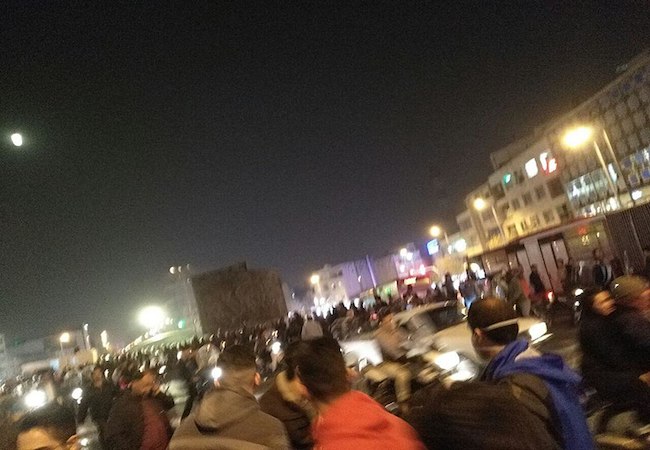Public unrest in Iran: a challenge for the theocratic regime

By Noah Phillips
What began as a protest against the economic policies of the ruling government in Iran on December 28 in the city of Mashhad, the second largest city in the nation, quickly escalated into widespread national protests, questioning the regime and its high-ranking officials. Initially begun over the price of eggs, one of the many common goods affected by the gross inflation in Iran, protests soon took a far more political note, with deliberations and clashes over religious standards and foreign policy. The protests were arranged loosely and spontaneously and rapidly reached a national audience rallying in support. Unrest erupted over the course of less than a week in the numerous major cities in Iran, including the capital and largest city, Tehran.
Protesters initially mobilized using social media, making use of encrypted messaging applications like the prevalent messaging apps Telegram and WhatsApp. As the protests took shape nationally, Iranian authorities cracked down on internet access and other social media, including Instagram temporarily, and Telegram. “A Telegram channel is encouraging hateful conduct, use of Molotov cocktails, armed uprising, and social unrest. Now is the time to stop such encouragements via Telegram,” said Minister of Communications Mohammad-Javad Azari Jahromi.
The 2017-18 protests in Iran are noted to be the most cataclysmic and immense in nearly a decade, since the 2009 Green Movement, protests that spanned many months involving millions of protesters against the potentially fraudulent election of President Mahmoud Ahmadinejad.
In the recent clashes, which quickly turned confrontational, 21 have been reported dead and over 450 arrested, including a European citizen of unspecified national origin, according to the Tasnim News Agency, a state-run media outlet. The Islamic Revolutionary Guard Corps (IRGC) or Revolutionary Guard in Iran was dispatched to the three major provinces of Isfahan, Lorestan, and Hamadan in Iran to suppress and mitigate the vigor of the protests. Police and military forces numbering in the thousands reportedly scuffled and threw tear gas at protesters.
The Iranian government and Revolutionary Guard orchestrated counter-protests on December 30 as a show of power and stability, broadcast on state-controlled television and media, bringing roughly four thousand to the streets, adorned with banners and flags of Ayatollah Khamenei.
Much of the animosity leading to the recent protest evolved from frustration out of a lack of economic improvement, in spite of President Rouhani’s recent campaign promises to reduce unemployment. Rouhani found great support from the population of Iran when he brokered the nuclear proliferation agreement for Iran with the United States, which absolved many imposed international economic sanctions. Iranians took the signing of this deal to translate to economic improvements, a hope that as of late is yet to be attained. Iran’s unemployment rate is abysmal, with 24% of 15-29 year-olds without a job according to CNN Money. Dually, the cost of simple necessities in Iran has skyrocketed nearly 40%, resulting in tremendous economic disparity and a lack of accessibility to basic goods for the people of Iran.
Protesters similarly took issue with the interference of Iran in foreign affairs, namely involvement in Syria, questioning why the government of Iran was so concerned with other nations when its own people were suffering immensely from the depleted economic status of the country. Protesters chanted, “Death to the dictator,” and “Death to Rouhani” alluding to Ayatollah Ali Khamenei and President Hassan Rouhani respectively, as they hurled stones at security forces.
Many Iranians harbor a dissenting sentiment to the results of the Islamic Revolution of 1979, regimenting strict Sharia law and a theocracy onto the populace rather than a democratic government. Such policies dating back to 1979 have resulted in pent-up anger in much of the population, a factor that is demonstrated in the protests. A Tehran resident even waved her hijab, a mandated article of clothing for women since the Islamic Revolution, whilst standing on top of a street barrier in a poignant and rebellious effort that has since gone viral in Western media, making her a “symbol of defiance” according to The Independent. Karim Sadjadpour, an expert and analyst on Iranian affairs, noted that “In 1979 Iranians experienced a revolution without democracy; today they aspire for democracy without a revolution.”
According to Iranian and Hezbollah officials, the protests seem to be nearing their conclusion, not enduring near the length of the Green Movement. “Our security preparation and public scrutiny allowed the enemy to be defeated again because if our situation was like Egypt, Syria, and Libya, the Islamic Republic of Iran would have suffered irreparable damage,” said Mohammad Ali Jafari, leader of the Islamic Revolutionary Guard Corps on the political protests. The chief of Hezbollah, a terrorist organization closely aligned with and funded heavily by the Iranian government, Hassan Nasrallah considers the protests in Iran to be “contained” and claims that there should be no further concern regarding the issue. Nasrallah dually claimed two sworn enemies of Iran’s, the United States and Israel, to be co-conspirators in promoting the reformist protests in an attempt to cripple Iran to perpetuate their agenda, a tactic, which Nasrallah says, is futile. President Rouhani made similar remarks about the US and Israel, which Prime Minister Benjamin Netanyahu dismissed as “laughable” claims.
President Trump condoned the actions of the Iranian protesters who he said are attempting “to take back their corrupt government,” in a tweet on January 3. Trump added that the United States would support the people of Iran “at the appropriate time.” United States Ambassador to the United Nations Nikki Haley also voiced support for the Iranian people in their protest.
Noah Phillips is a young writer with a keen interest in Jewish and Israeli affairs. He is the founder of the Jewish Examiner as well as a syndicated columnist for various publications. Follow Noah on Twitter @noahaphilli




